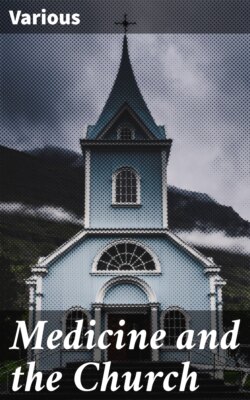Читать книгу Medicine and the Church - Various - Страница 11
На сайте Литреса книга снята с продажи.
The Surgeon, the Clergyman, and the Patient
ОглавлениеPossibly the gravest shock that a human being may receive, so far as it concerns himself or herself, is to be told that fatal disease is present in the system. So great may be the actual shock that many a medical practitioner shrinks from inflicting it, and purposely avoids direct allusion to the certainty of dissolution. Whether this is justifiable or no, depends very largely upon the susceptibilities of the patient and the tact of the doctor. But the word ‘operation’ is, by some, almost as much dreaded as the word ‘death’; in fact even more, as it always implies to the lay mind the infliction of hours of pain, and days of discomfort, though this is far from being the truth in most instances.
‘Rather let me die than make me undergo an operation’ is the not infrequent remark of the highly-strung sufferer. And then comes in all the sympathy, tact, and good breeding of the surgeon. He will gently explain matters, will show how the disease is such that nothing short of removal of the growth holds out the least chance of life or the avoidance of later severe pain, and will state, what is the truth, that the operation, short and sharp, will give years of freedom from suffering even if it does not completely remove all trace of the trouble. How bewildered the patient will feel! He has been hoping against hope that his malady is only a slight one, and that it may be ‘dispersed’ by some magic of physic, and now his hopes have been rudely mocked and shattered. Surely here, if ever, help from an outside source is needed and should be welcomed. But such help must be rational, based on truth, and fearing not the consequences.
Supposing the disease is cancer, what awaits him if the sufferer flies to the quack and is befooled till all hope of successful treatment is gone? Or rushes to the Christian Scientist, who, with seeming bona fides, avers there is no such thing as a cancer cell! The eye that has seen it a hundred times under the microscope, and can recognise it amongst a hundred other varieties, does not exist in the purblind conception of such a ‘Scientist,’ for the cell is matter, it cannot exist, and neither for the same reasoning, if consistency is maintained, can the eye which sees the cell exist, for it also is material.
And still as the growth increases there is the lurking certainty ever protruding itself that after all the surgeon was right, and the days are slipping by. Would that friends could be true and friends indeed, and not in ignorance hinder these circumstances, not mere blind leaders of the blind.
It is here if anywhere the enlightened clergyman and the surgeon may join hands for the good of spirit and body. And then when a decision has been arrived at calmly and deliberately, and the time of the operation has been fixed, there is still work for both the minister and the surgeon to do. A quiet talk and prayer the evening before the ordeal, how it has often soothed the trembling soul, and invoked a night of rest and refreshment, enabling the patient to meet the trials of the morning calm, because mentally and physically there has been repose.
And the surgeon with his cheering word, and the anæsthetist with his quiet reassuring manner and conversation, both tend to allay any fresh alarm at that which is perhaps the most trying moment of all—the placing oneself unreservedly in the hands of the operator.
Surely, surely here is a period when the efforts of the spiritual are to crown the success of the material.
And then, observe how the quiet and confidence, engendered by the combined efforts of pastor and doctor, continue during convalescence, causing that period to be shortened in many a case.
In a hundred different ways members of the two professions may work hand in hand, but each should be able to mutually esteem the other and give to each his proper place and function. They ought never to despise one another, because they ought never to encroach on one another’s province.
Till the clergyman recognises that it is his duty to understand something of elementary physiology, if he is going to be a benefactor to spirit and body, and the medical practitioner is willing to admit that there are spiritual forces which can be brought to help the perfection of his work, so long is it the opinion of the writer that the sufferer who looks to both of them for aid will fail to receive his full due of assistance. May the time soon come when the rising generation of all classes may be so taught at school, and in church, that they will come to understand something of the composition and need of the tripartite nature of man, and may the day speedily dawn when the enlightened clerical and medical professions mutually work for the good of the whole, spirit, soul and body.
F.R.C.S.
MEDICINE AND RELIGION
BY
CHARLES BUTTAR, M.D.
SOMETIME PRESIDENT OF THE HARVEIAN SOCIETY
